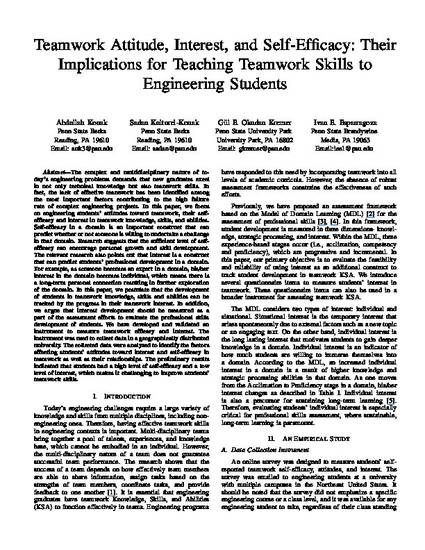
Presentation
Teamwork attitude, interest, and self-efficacy: Their implications for teaching teamwork skills to engineering students
IEEE Frontiers in Education Conference
(2015)
Abstract
The complex and multidisciplinary nature of today’s
engineering problems demands that new graduates excel
in not only technical knowledge but also teamwork skills. In
fact, the lack of effective teamwork has been identified among
the most important factors contributing to the high failure
rate of complex engineering projects. In this paper, we focus
on engineering students’ attitudes toward teamwork, their selfefficacy
and interest in teamwork knowledge, skills, and abilities.
Self-efficacy in a domain is an important construct that can
predict whether or not someone is willing to undertake a challenge
in that domain. Research suggests that the sufficient level of selfefficacy
can encourage personal growth and skill development.
The relevant research also points out that interest is a construct
that can predict students’ professional development in a domain.
For example, as someone becomes an expert in a domain, his/her
interest in the domain becomes individual, which means there is
a long-term personal connection resulting in further exploration
of the domain. In this paper, we postulate that the development
of students in teamwork knowledge, skills and abilities can be
tracked by the progress in their teamwork interest. In addition,
we argue that interest development should be measured as a
part of the assessment efforts to evaluate the professional skills
development of students. We have developed and validated an
instrument to measure teamwork efficacy and interest. The
instrument was used to collect data in a geographically distributed
university. The collected data were analyzed to identify the factors
affecting students’ attitudes toward interest and self-efficacy in
teamwork as well as their relationships. The preliminary results
indicated that students had a high level of self-efficacy and a low
level of interest, which makes it challenging to improve students’
teamwork skills.
Disciplines
Publication Date
October, 2015
Location
El PAso, TX
DOI
10.1109/FIE.2015.7344118
Comments
© 2015 IEEE. Personal use of this material is permitted. Permission from IEEE must be obtained for all other uses, in any current or future media, including reprinting/republishing this material for advertising or promotional purposes, creating new collective works, for resale or redistribution to servers or lists, or reuse of any copyrighted component of this work in other works.
Citation Information
Abdullah Konak, Sadan Kulturel-Konak, Gül E. Okudan Kremer and Ivan E. Esparragoza. "Teamwork attitude, interest, and self-efficacy: Their implications for teaching teamwork skills to engineering students" IEEE Frontiers in Education Conference (2015) Available at: http://works.bepress.com/gul-kremer/33/
